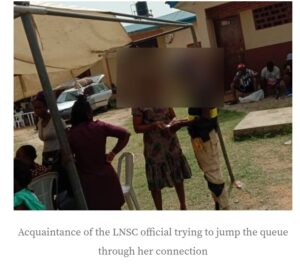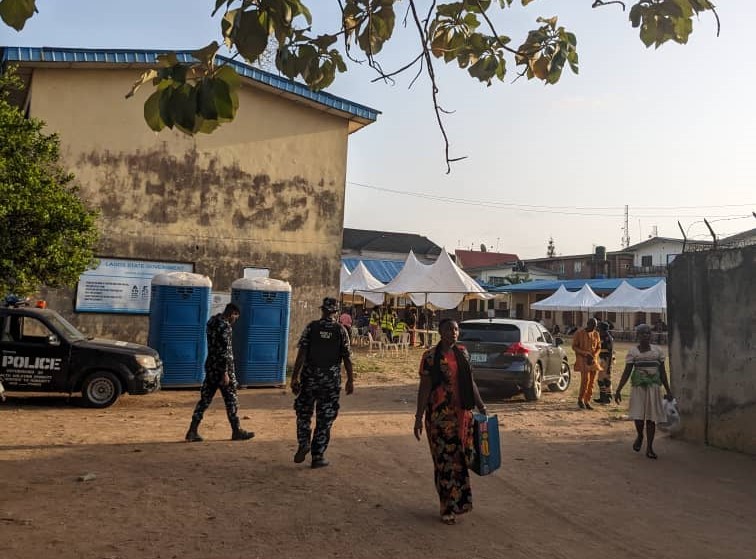At 37.92 percent, Nigeria has one of the highest rates of food inflation in the world. Data suggests that it only fares better than a few countries, like Venezuela, Turkey, Zimbabwe and Argentina.
So, when the Lagos State Government announced the Ounje Eko initiative in March, it was received with optimism by Lagos residents. Per the state government, the scheme would sell staple food items like eggs, rice, beans, pepper and garri at 25 percent less than their market prices.
Some other modalities of execution were put in place. First, the government designated 27 locations to serve as market points across the local government areas in Lagos State. The scheme was also designed to use voucher systems and digital payment solutions for easy monitoring and transparency.
The Ounje Eko scheme appeared well intentioned and designed to be effective. To see if the intention translated to anything tangible, I visited two of the market locations, one at the Tokunbo Ali Primary School and the other on the Adeyemi Bero premises.


EMPTY MARKETS
When I first got to Tokubo Alli Nursery and Primary School on March 17, I arrived at 3:50 pm, some 10 minutes before the designated closing time. I did indeed consider the possibility of meeting a crowd of people, but I experienced a little difficulty locating the school.
It took me an extra 45 minutes to figure out where Mojidi Street or John Ogudu Street was in the maze that is Ikeja. Instead of a full market, however, I arrived at an almost empty school with security officials.
At the gate, I met a woman who was about to exit the market. This woman saw me with a list, gave me a knowing smile and broke the news of my lateness. She told me about the turnout of people and explained why I should have been there earlier. Pointing to the white polythene bag she was carrying, she said she only managed to get pepper out of all the things on her list.
“See, I came around 2 pm and I met a lot of people here. There was a long queue, and they gave us numbers. If you want to come next time, come early, or you will meet the same situation as today,” she said as she made to leave.
I thanked the woman and acknowledged her with a smile and a nod when she left through the gate. Seeing that the market was almost empty, I walked up to the police officers in the school. A few of them sat under the tree by the left side to the entrance, and I figured I could use a few answers from them.
An official of the Lagos State Neighbourhood Safety Corps (LSNSC) walked up to me instead and asked what I wanted. I told him I wanted to buy food, and he almost absent-mindedly told me the market had closed for the day.
“Come back tomorrow. You are a little late today o, Oga,” he said. “There were many people, and some of the food sold very fast. You may still be able to get garri. I am not sure.”
“Tomorrow”? I asked, knowing that the market was weekly and slated for Sundays only.
He then told me to check back early the following Sunday if I was serious about getting food.
I thanked the friendly LSNSC official and slowly exited the school. My exit, however, was against the backdrop of a conversation between a stoutly built man and his tall friend. They seemed impressed and were comparing the prices of bread and eggs. The taller one said he would be back the following week to get other food items.
I decided to check out the other location of the market in Alausa since I judged that it was closer to where I was. I got to Adeyemi Bero around 4:30 pm to find no sign of a market.
I thought the market closed early or was not held at all. One of my assumptions, as I would find out the following Sunday, was wrong.
EGGS SELLING FAST AND A VERY LONG QUEUE OF PEOPLE
On March 24, I arrived at the Tokunbo Alli Nursery and Primary School again. This time around, I took the advice of the friendly LSNSC official and the woman I met the previous week and got to the market at about 1 pm. As expected, I met a considerably large crowd of people waiting in line under a white canopy to get food items. There were about five food canopies inside the school.
The canopy was already filled up. Those who could not find a seat under the canopy sat in front of the school toilet on the left side of the canopy.
I got to the canopy to see a tall woman in a reflexive jacket calling numbers and arranging people in a single file. She had just called someone with the tally number 120 and told the rest to wait until the stalls were freed up.
I learned, after about a minute, that I would also have to get a number and wait my turn. To the other side of the crowd, I saw five white food canopies with buyers, vendors and food items. The canopies also had a considerably large crowd under each.
So, I walked up to the woman coordinating the queue and asked how I would get a tally. She called a lady, Tope, who assisted her in the process and told her to get the tallies ready. When Tope handed my tally to me, I was a bit surprised. I was number 323 on the list.

About 30 minutes after I had waited under the canopy, a man in a reflective jacket came to address the waiting people. He appeared to be higher up in the rank of people running the market
“How many people want to buy eggs? We are almost out on eggs today,” said the man. In response, almost all the people under the canopy raised their hands. He sighed.
He asked again how many people wanted to buy just eggs, and a considerable number of people raised their hands. They were almost as many as the original number. Then he tried finding out the number of people who were not buying eggs at all. The number of people, as expected, was very small, almost negligible.
“We have to reduce the number of crates you can buy to one now. Because if we go with the two crates per person limit, it won’t go round. Do you understand?” He asked.
The people answered in the affirmative; some women greeted him and tried explaining the situation to others. Seeing that everyone had got the message, the man left. I walked up to one of the vocal women in the group and asked her about the egg situation.
The woman, bespectacled and light-complexioned, told me that eggs sold almost three times as fast as any other food item because they were noticeably cheaper than the market price. She also told me that she suspected that people would buy the eggs and resell them at the market value if the coordinators did not limit the number a person could buy.
“Everyone you see here came to buy eggs. It’s N2700 per crate here. It’s about N3600, depending on which area you live in, in this Ikeja. If they don’t set a limit like that, some people will get here early and pack everything. I also think people are buying to sell again on their streets; you know, Nigerians and business,” said the woman.
NO CASH PAYMENT, PRICES TALLY WITH GOVERNMENT LIST
Since I learned that eggs were fast-selling, I decided to just stick to bread, pepper and maybe garri. While the 180th person in the queue was being attended to, I engaged some of the people who had experienced the market. I wanted to find out if the people running it stuck to the modalities announced by the Lagos State Government. I started by asking around if I could pay in cash, and the response I got was unanimous. They didn’t take cash; the people who answered me said that I could use the point of sale (PoS) machine if I had a debit card.
I confirmed if people indeed got food at the discounted price and compared the prices to what people would get in the market. Again, I got an almost uniform response from the three people I spoke to. Most of them told me that the food items, especially the eggs, pepper, and bread, were cheaper than what they would get in the conventional market.
One of the people I spoke with, a middle-aged woman who was there with her teenage daughter, surmised every other person’s contribution.
“If you consider the time you will spend waiting, it may not be worth it, considering that the prices of rice, beans and garri do not differ so much. But you see, if you consider the cost of eggs, bread and pepper today, people don’t mind staying in the queue,” she said.
“I didn’t mind staying in the queue, too, and waiting. The only downside is the time you’ll waste. You won’t stay that long in normal markets. But yes, the prices don’t differ from what we read on that list.”
KNOWING SOMEONE WHO KNOWS SOMEONE
As I was speaking to some of the people who had experienced the market, I noticed a slight ruckus in the canopy that sheltered people who were still waiting their turn. Some of the women had raised the alarm that some individuals were jumping the queue with the help of some of the coordinators.
I asked one of the women who had spoken up about her observation, and she pointed to a few people she thought had arrived after her holding polythene bags of food in the stalls.
Another woman jumped in on our conversation and said that it was not the first case she had noticed. The woman who was coordinating the line came toward the tent to pacify the dissatisfied woman and assure her that due process was being followed.
With this prompt, I paid attention to the people who were walking up to the line. After about 15 minutes of waiting, an LNSC officer walked up to the canopy and greeted one of the women cheerily.
The corp was a slenderly built, not-too-tall man who appeared to be middle-aged. The manner of the pleasantries they exchanged suggested that they were acquaintances.
The woman then asked him if there was a way around the queue since every other person was using their connection. The officer did not hesitate. He took her list and her card from her and offered to buy all the things she wanted in her place.

The LSNSC officer disappeared towards the stall for another 30 minutes. The next time I saw him, he came to the canopy and stylishly motioned to the women to follow him. He led her away to a place where I suspect he had kept some of the food items she paid for.
But it didn’t stop there. I observed that the woman did not visit the market alone. So she took the list of one other woman, collected her card and disappeared towards the part of the school where she had first gone with the LSNSC officer.
Quite ironically, some of the people who had complained of cheating saw the entire process play out and didn’t bat an eye. I learned from the conversations that ensued afterwards that she was not the first.
“I won’t blame her for doing that. If I knew someone on the side, too, I would have them get my food for me and leave this place,” one of the men who observed the exchange commented absent-mindedly.
ADEYEMI BERO AND CONFLICTING DATES
As soon as I figured out that, with the long queue, I might not get a chance to buy food at the Tokubo Alli Primary School market, I tried Adeyemi Bero in Alausa again. So, I bid farewell to the people that I was discussing with and left the school.
Since I had been to Adeyemi Bero the previous week, it was very easy to identify. For that reason, I got there quite early, considering when I left Tokunbo Alli. It was about 15 minutes before 4 pm.
But like the previous week, I didn’t see any sign that there was a food market on the premises. I saw some people file out of the premises in what appeared to be an attempt at a group photograph. I asked one of them, a lady, if she knew anything about the market. Confused, she pointed me to the security officer at the gate.
When I asked the security man, his response was straight and simple. “The market doesn’t hold here on Sundays. It holds on Thursdays,” he told me. I told him that the state had announced a weekly affair and it was slated for Sundays.
As respectfully as he could, the security officer reiterated what he said and told me to check back again the following Thursday.
FIJ
